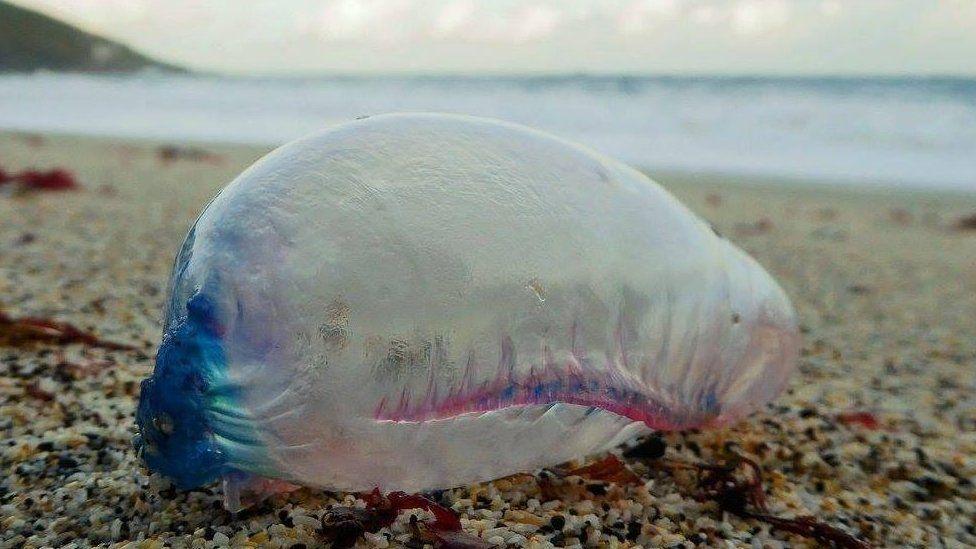Portuguese man o' war spotted on Donegal beach

This is what a Portuguese man o' war looks like when it is fully inflated
At a glance
There have been previous sightings of the jellyfish-like creature on beaches in County Clare and County Antrim.
The creature can deliver a toxic sting, which can be fatal.
Jellyfish are common on Irish beaches but the man o' war is rare in colder North Atlantic waters.
The public are being asked to help collect data on the number of sightings on the Irish coast.
- Published
Beachgoers are being warned to be careful after a further sighting of the jellyfish-like Portuguese man o' war on a beach in the Republic of Ireland.
It was washed ashore at Derrybeg beach in County Donegal and follows recent sighting in other parts of the island of Ireland.
A photo of the creature was shared on social media, external on Wednesday.
Dr Donal Griffin, of environmental body Fair Seas Ireland, said even when washed up the man o' war's sting "can be quite serious" and urged the public to leave the creatures "well alone".
Allow X content?
This article contains content provided by X. We ask for your permission before anything is loaded, as they may be using cookies and other technologies. You may want to read X’s cookie policy, external and privacy policy, external before accepting. To view this content choose ‘accept and continue’.
Dr Griffin told BBC News NI the creature in the photograph was almost certainly a man o' war.
“You can see the gas filled bladder, the colours are right, the tentacles, the way they drape down, are right," he said.
“They can be quite exciting to see because they are that little bit more unusual, little bit more exotic."
'Mercy of the winds'
Dr Griffin urged the public to be cautious.
“In the water their tentacles can be hard to see so swimmers should keep a good distance," he said.
"And even when washed up on the beach, when they are dead or dying, their sting cells can still trigger”.
Portuguese man o' war resemble jellyfish but are a species of siphonophore and they can cause painful stings if people come in contact with their tentacles.
They can be fatal for those who may suffer a severe reaction.
It is believed the siphonophore’s name comes from the shape of the sail which, when it is inflated, looks like an 18th Century Portuguese battle ship.
Last month a man o' war was spotted in Northern Ireland on the West Strand beach in Portrush, while earlier this month sightings were reported on a number of beaches in County Clare in the Republic of Ireland.
Jellyfish are common on Irish beaches but the man o' war is rare in colder North Atlantic waters.
Dr Griffin said their physiology left them “at the mercy of the winds and of the tide”.
He urged anyone who spots one to report it to the Centre for Environmental Data , externaland Recording in Northern Ireland or the National Biodiversity Data Centre, external in the Republic of Ireland.
That will help determine if there are more man o' wars in Irish coastal waters than previously thought, he added.